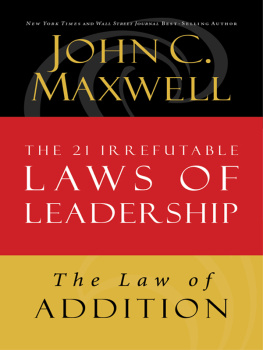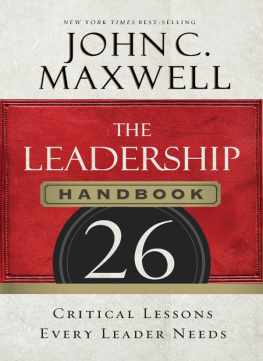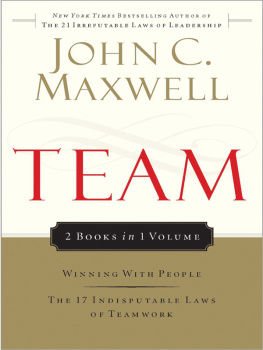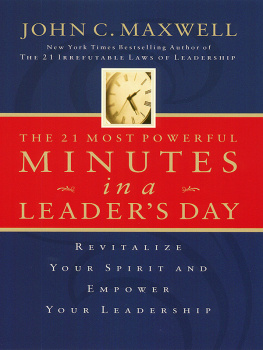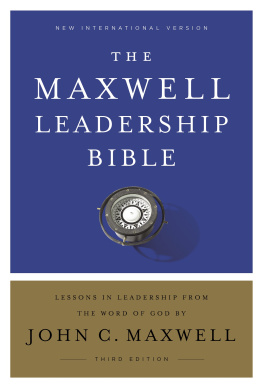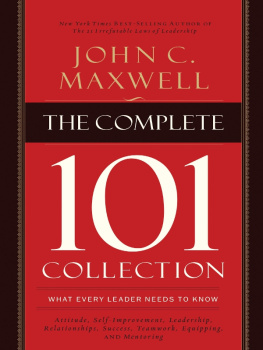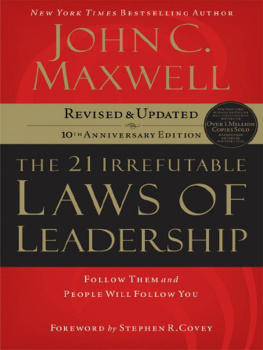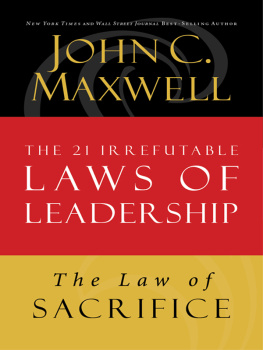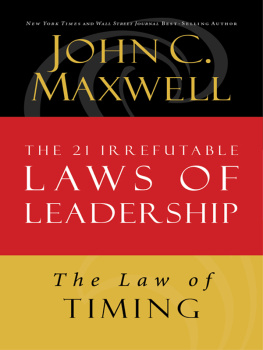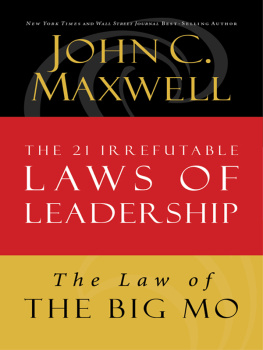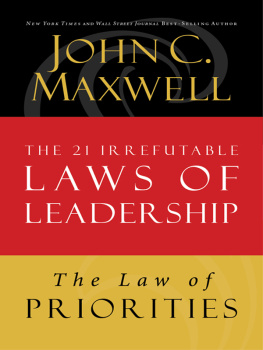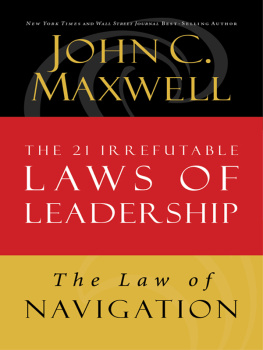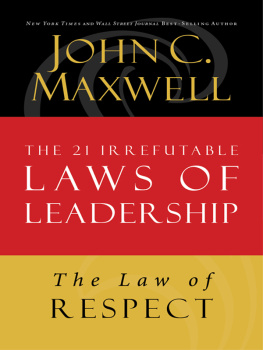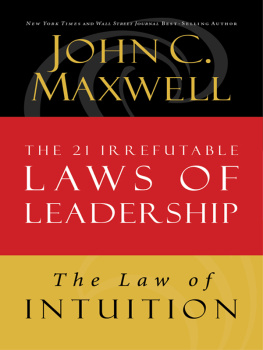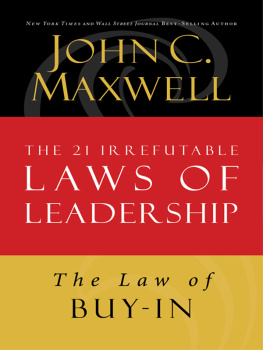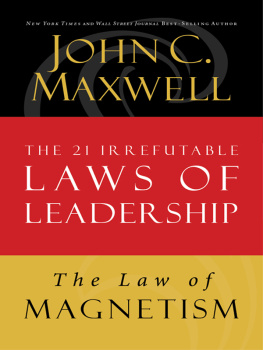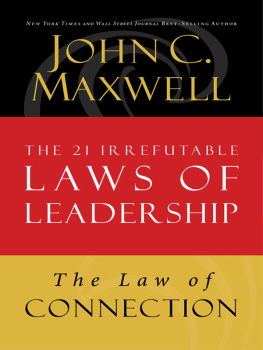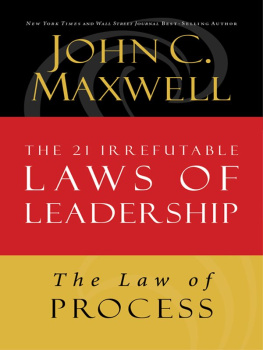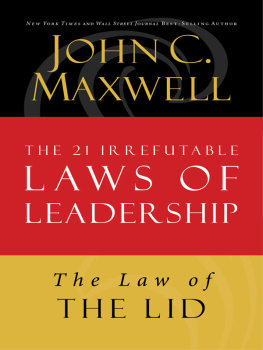
1998 and 2007 by John C. Maxwell
This ebook is derived from The 21 Irrefutable Laws of Leadership, by John Maxwell, 1998 and 2007 by Maxwell Motivation, Inc., a Georgia corporation.
All rights reserved. No portion of this book may be reproduced, stored in a retrieval system, or transmitted in any form or by any meanselectronic, mechanical, photocopy, recording, scanning, or otherexcept for brief quotations in critical reviews or articles, without the prior written permission of the publisher.
Published in Nashville, Tennessee, by Thomas Nelson. Thomas Nelson is a trademark of Thomas Nelson, Inc.
Thomas Nelson, Inc. titles may be purchased in bulk for educational, business, fund-raising, or sales promotional use. For information, please e-mail SpecialMarkets@ThomasNelson.com.
Published in association with Yates & Yates, LLP, Attorneys and Counselors, Orange, California.
Scripture quotations noted CEV are from THE CONTEMPORARY ENGLISH VERSION.
1991 by the American Bible Society. Used by permission.
Scripture quotations noted The Message are from The Message: The New Testament in Contemporary English. 1993 by Eugene H. Peterson.
ISBN 978-0-7852-7431-5 (HC)
ISBN 978-1-4185-3831-6 (ebook)
ISBN 978-1-4002-7564-9 (ebook of Chapter 5)

This book is dedicated to Charlie Wetzel, my writing partner since 1994. Together weve written more than forty books, and Ive enjoyed our collaboration on every one. As I have labored to add value to others by identifying and teaching leadership principles, Charlie, you have added value to me and my efforts. Your insights and skills as a wordsmith have been enjoyed by millions of readers. As a result, you have made a greater impact on more people than has anyone else in my inner circle. For that I thank you.
CONTENTS


Thank you to the thousands of leaders around the world who learned and sometimes challenged the laws of leadership, thus sharpening my thinking.
Thank you to the team at Thomas Nelson who gave me the chance to revise and improve this book, and especially to Tami Heim for her strategic leadership and to Victor Oliver who was instrumental in the development of the original concept.
Thank you to Linda Eggers, my executive assistant, and her assistant, Sue Caldwell, for their incredible service and willingness to go the extra mile every day.
Thank you to Charlie Wetzel, my writer, and Stephanie, his wife, with-out whose work this book would not have been possible.

Leaders Add Value by Serving Others
In a world where many political leaders enjoy their power and prestige and where CEOs of large corporations make astronomical incomes, work and live in luxury, and appear to be most concerned with whats in it for them, Jim Sinegal is an oddity.
Sinegal is the cofounder and CEO of Costco, the fourth largest retailer in the United States and the ninth largest in the world. He doesnt seem much interested in perks. He works in an unremarkable office comprised primarily of folding tables and chairs. If he invites someone to meet him at the corporate offices, he goes down to the lobby to meet his guest. He answers his own phone. And he takes a salary of only $350,000 a year, which puts him in the bottom 10 percent of CEOs of large corporations.
Sinegals path to corporate leadership wasnt typical either. He didnt attend an Ivy League school. He isnt a lawyer or a CPA. As a teenager, he thought of becoming a doctor, but his high school grades were less than stellar. So he went off to community college and earned an associates degree. While he was attending San Diego State College (now University), he helped a friend unload mattresses at a new local retail store called Fed-Mart. That one day of work turned into a regular job. When he received a promotion, he discontinued his studies. He had found his career. In time, he had also found a mentor, Sol Price, Fed-Marts chairman. Under Prices guidance, Sinegal rose to the post of executive vice president for merchandising. Sinegal later helped Price found Price Club and then went on to cofound Costco in 1983 with Jeffrey H. Brotman. The companys growth was rapid. Costco purchased and merged with Price Club ten years later.
ADDING PROFITS BY ADDING VALUE
Retail experts give a lot of attention to Sinegals formula for success: offer a limited number of items, rely on high volume sales, keep costs as low as possible, and dont spend money on advertising. But there is something that separates him from the competitors who employ similar strategies: the way he treats his employees. He believes in paying his employees well and offering them good benefit packages. Costco employees are paid an aver-age of 42 percent more than the companys chief rival. And Costco employees pay a fraction of the national average for health care. Sinegal believes that if you pay people well, You get good people and good productivity. You also get employee loyalty. Costco has by far the lowest employee turnover rate in all of retailing.
But Sinegals leadership style of adding value doesnt end with employee compensation. He goes out of his way to show Costco workers that he cares about them. He maintains an open-door policy with everyone. He wears an employee name tag, is on a first-name basis with everyone, and makes sure to visit every single Costco store at least once a year.
No manager and no staff in any business feels very good if the boss is not interested enough to come and see them, says Sinegal. And when he shows up, his people are always glad to seem him. The employees know that I want to say hello to them, because I like them.
Sinegal once flew from Texas to the San Francisco area when he heard that a Costco executive was hospitalized for emergency surgery. It came as no surprise to the executive. It was consistent with the way Sinegal always leads.
LEADERSHIP LESSONS LEARNED EARLY
Sol Price, Sinegals one-time mentor, says, Jim has done a very good job in balancing the interests of the shareholders, the employees, the customers, and the managers. Most companies tilt too much one way or another. Many of the lessons Sinegal learned came from Price, who believed in treating people well and giving them credit. In a meeting at Fed-Mart, Sinegal noted that a manager was quick to take the credit and to place blame on others. But Price saw through him.
To teach us all a lesson, recalls Sinegal, Sol used a weekly meeting to purposely raise hell about something that was wrong in one of the stores. I wondered why he did it. But when he saw that this manager let two of his employees take the blame, he fired him within a week.
Its improper for one person to take credit when it takes so many people to build a successful organization, asserts Sinegal. When you try to be top dog, you dont create loyalty. If you cant give credit (and take blame), you will drown in your inability to inspire.
The only real criticism of Sinegal comes from Wall Street. Analysts there believe that Sinegal is too kind and generous to his people. They would like to see him pay employees less and squeeze them more. But Sinegal wouldnt think of it. He believes that if you treat the employees and customers right, profits will follow. On Wall Street, he observes, theyre in the business of making money between now and next Thursday. I dont say that with any bitterness, but we cant take that view. We want to build a company that will still be here fifty and sixty years from now.
Next page
